Paul Levinson's Blog: Levinson at Large, page 128
May 30, 2020
Spaceship Earth: The Misunderstood Success
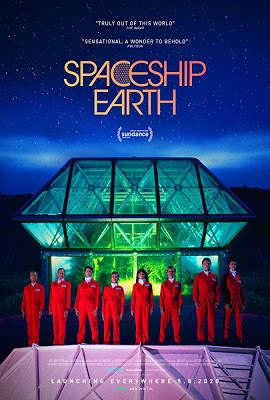
I don't often watch documentaries, and review them even less often, but Spaceship Earth is an exception, because it tells at least two highly significant stories: (1) the attempt to construct a totally self-contained environment or biosphere (Biosphere 2) on Earth, with human inhabitants, as a template for what could be sent out to our solar system and beyond in the future; and (2) the media misreporting of what Biosphere 2 accomplished.
The truth is that Biosphere 2 was unable to maintain total self-sufficiency. At seventeen months into its two year 1991-1993 mission, oxygen was imported from the outside into the biosphere to combat the sharp reduction in oxygen from 20.9 to 14.2 percent of the biosphere atmosphere. Obviously, this is not something that could have been done in the middle of a mission to Mars or anyplace off the Earth. But the media were wrong to report this as evidence that the Biosphere 2 mission failed, or was some kind of publicity stunt rather than a scientific experience. Apparently no one in the media read British philosopher Karl R. Popper (for example, The Logic of Scientific Discovery), and his widely accepted view that mistakes are the way that science learns and progresses.
The Hulu documentary, named after Buckminster Fuller's apt characterization of our planet as "spaceship Earth," does a fairly good job of reporting and assessing the above, relying on extensive current and historical in-situ interviews with most of the central players in the Biosphere project, including the Biosphereans themselves. I know at least two people who provided support for Biosphere 2, Carl N. Hodges, an atmospheric physicist at the University of Arizona, who was not in the documentary, and Kathy Dyhr, Director of Public Affairs for Biosphere 2, who had a major role in the documentary. I had long and riveting conversations with each of them in the mid-1980s, when Biosphere 2 was under planning and construction, and both were students at the Western Behavioral Sciences Institute pioneering online education program, where I was a faculty member and was first introduced to online education, which gave me the idea for Connected Education and which has become so important during our current Coronaviris pandemic. These conversations, as well as my knowledge of how science works, and plain common sense, are what led me to conclude that the media assessment of Biosphere 2 was so wrong.
But why, then, did the media jump on the bandwagon of Biosphere 2 failure? The documentary provides one of the two answers. Steve Bannon - yes, that Steve Bannon - was brought in by financer Ed Bass to run the Biosphere managing company (Space Biosphere Ventures). Apparently Bannon sought to make a name for himself by publicly and repeated denouncing the project (including destroying some of the crucially valuable data it had collected, according to the documentary).
The second reason is more endemic and intrinsic to the media and to us, its public. As Phil Ochs pointed out so well in his song "The Crucifixion" (1966), we love to tear down, or see torn down, that which we have built up for adulation. The idea that we could build here on Earth a habitat which with proper propulsion could take us to the stars was heady, intoxicating stuff. When it failed to achieve that goal in at least one critically important way, the disappointment that resulted was enough for the media and many viewers to discard the entire project as an ambitious entertainment gambit that flopped.
But facts are stubborn things, and I expect the documentary to continue to bring the truth of Biosphere 2 out to the world and the future, which is that it was an important and major first step that taught us a lot about how we can get beyond this planet to the cosmo beyond.
 Paul Levinson's books ... Paul Levinson's music
Paul Levinson's books ... Paul Levinson's music
Published on May 30, 2020 10:39
May 29, 2020
Angel Has Fallen: Great Performances and Resemblances
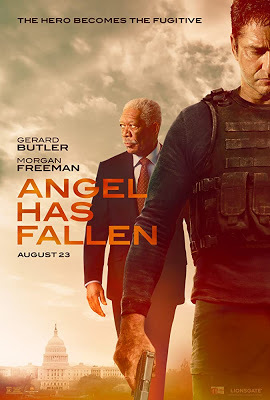
So we saw Angel Has Fallen (2019) on Netflix last night. It's the third in the "Fallen" series - Olympus Has Fallen (2013), London Has Fallen (2016) - a nonstop adrenalin saga of Agent Mike Banning overcoming traitors and what seems like hundreds of armed commandos against him to save the U. S. President, now Allan Trumbull, played by Morgan Freeman, who has moved up from Speaker of the House, to Vice President, to now President in the trilogy. I enjoyed the first two movies a lot, but didn't review them, for who knows why.
What I liked most about Angel Has Fallen is Nick Nolte, who puts in an appearance as Clay Banning, Mike's father, a hermit with munitions savvy whom Mike aptly characterizes as one step away from the Unabomber. But Clay plays a crucial strategic role in this story, and I'm maybe only slightly exaggerating when I say this may be Nolte's best performance and part since Rich Man, Poor Man in 1976, though I truthfully can't think of another movie or television series in which Nolte was so surprisingly effective.
Also notable in this movie is Danny Huston, who has been one my favorite villains since his Ben Diamond in the all-too brief Magic City TV series (2012-2013). He projects a combination of intelligence, moral structure that allows him to do great evil, with an underlying adherence nonetheless to some kind of code with some trace of, if not integrity at least its style, that makes him the ideal ultimate antagonist for Mike Banning.
Freeman as Trumbull of course makes an angel to devil comparison of what's now in the White House in our off-screen reality, but there was an eerie suggestion of Trump nonetheless in Trumbull's Vice President, played by Tim Blake Nelson, who reminded me of current U. S. Secretary Steven Mnuchin. Check out the photos below if you think I'm crazy:
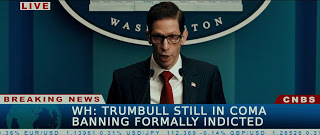
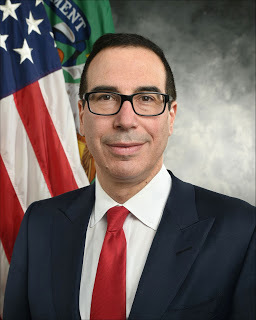 Steven Mnuchin
Steven MnuchinPaul Levinson's books ... Paul Levinson's music
Published on May 29, 2020 13:24
May 28, 2020
Outer Banks: Top Notch Waves and Intrigue

As I mentioned in my review a couple of weeks ago of the first episode of Hightown, I'm always up for a TV series or movie that takes place in a sea town on the East Coast of the United States. But with the lockdown keeping me and family from going up to Cape Cod, it's especially good to see those Atlantic waves splashing around a narrative.
So, I would've likely liked Outer Banks, which takes place on the string of islands off the North Carolina coast, in any case. But by the time the 10-episode first season of the series concluded on Netflix, which my wife and I binged the past two nights, I found myself riveted to the screen and loving it.
Outer Banks actually starts off just ok, not great, a mildly diverting story of teenage shenanigans, rivalries, and romance on one of those islands. But there's a dark undercurrent from the beginning - the father of one the lead players, John B, has been missing for months - which soon turns into a powerful story of parent-child relationships and edge-of-your-seat pursuit of lost treasure with all manner of plausible, sharply focused heroes and villains.
The acting was also surprisingly excellent - surprising, because I didn't know most of the actors. I did know and liked Charles Esten from Nashville, and he brings to Outer Banks an unexpected range. Chase Stokes was excellent as John B, as was Madelyn Cline as his girlfriend Sarah. The two were very impressive in portraying a relationship that progressed from dissing to flirting to running for their lives. The supporting cast was also top-notch, with especially notable performances by Jonathan Daviss, Rudy Pankow, and Madison Bailey. But everyone in this vibrant cast made an impression on me, and I'll be looking for them from now on when I coast through Netflix and Prime Video.
I won't say anything more about the plot - because I don't want to give anything away - except that you can always distinguish a well-written narrative from the others in that surprises in the well-written narrative seem thoroughly plausible when you think of them in retrospect. Outer Banks has a lot of large and small moving pieces, which are brought together perfectly in the end. Hey, it's not as good as jumping in the cool waves off Cape Cod Bay, but I'll take it.
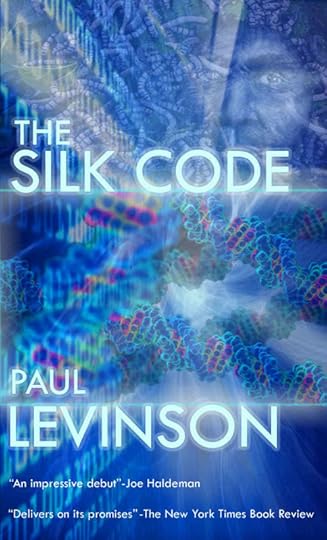
Paul Levinson's books ... Paul Levinson's music
Published on May 28, 2020 11:00
May 25, 2020
Uncut Gems: Drama at the Speed of Light

I realized years ago when I saw Milton Berle in a serious dramatic role - I think in The Oscar in the 1960s - that, contrary to what you might think, comedians can make excellent dramatic actors. Robin Williams confirmed this decades later, with a vengeance, in Insomnia.
Adam Sandler plays a serious role in Uncut Gems so frenetic that's it's almost beyond serious. But it's certainly not comedic. at least for the most part. Howard Ratner's a jeweler and a gambler, with a keen sense of both. But he moves so quickly that he's almost always out on a limb, in danger of being beaten or worse, and this applies to his personal as well as professional life.
His main adversary is his brother-in-law, played by Eric Bogosian, who is dead serious as Arno, and moves at a tenth of Sandler's speed, all of the time. Julia Fox puts in a good, even lovable performance as Howard's girlfriend Julia, and Idina Menzel has the perfect face and expressions for Howard's cheated-on wife. There's a greater seder scene, and I'm always a sucker for Yiddishkite.
Back to Howard, the thing is that he knows what he's doing, as a jeweler as well as a gambler. He has almost limitless confidence, however, and although it's often borne out, it also leads him to make difficult and dangerous bets. The formula leads Howard to near misses with fortune and death, and a face that looks increasingly like a punching bag.
But basketball not boxing is the sport in this fast-paced movie, and it all builds up to a crucial, complex, multi-faceted bet on a basketball game.
You can bet on its yourself if you like, but you'll never guess how the movie ends.

Paul Levinson's books ... Paul Levinson's music
Published on May 25, 2020 21:50
Joker: Fantasy and Canon
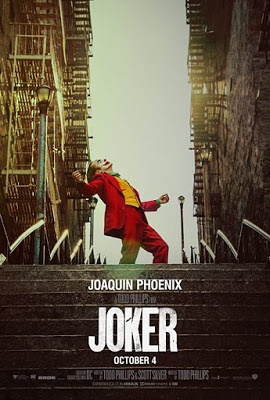
Checking in with a late review of Joker (2019), which the wife and I saw on HBO last night.
Let me stipulate several things:
Joaquin Phoenix was brilliant, inspired, incandescent, whatever superlatives you can find, in the title role. He eminently deserved the Oscar he won for that.I know a middling amount of Batman canon, but am no expert.I thought the movie held together very well as movie, which means I disagree with, for example, the inanely critical review in the New York Times, as I often do.I do have question about the ending, though. And the fact that I have questions makes me think that maybe the movie would have been better ending before this ending.Arthur Fleck, having actualized his impulses and become the Joker, is seen talking to his state-appointed shrink or social worker, but in a less dingy setting than at the beginning of the movie. One explanation of this scene, which I'd like to think is correct, is that Fleck, after escaping the cops in what I was wish was the closing scene, is nonetheless apprehended at some time in the future, and is now in some kind of penitentiary serving a life sentence for his crimes (or is he maybe on death row?).
But there's an alternate explanation (which my wife wondered about, and now I'm thinking about it too). We already saw, in the movie, that Fleck imagined making love and all the good things he did with his neighbor down the hall, Sophie. This establishes that Fleck's fantasies played a major part in the narrative we see on the screen. Is it possible that everything else we saw in the movie - Fleck's killing of De Niro's Murray Franklin (who, to me, is just as much Joe Franklin - believe it or not, I was once on his show, talking about my album, Twice Upon A Rhyme - as Murray is Johnny Carson), etc - were also just in Fleck's mind? Or, at least more of the major sequences than just Sophie as girlfriend?
In at least one Batman movie, if memory serves, the Joker kills Bruce Wayne's parents. In Joker, one of the myriad angry people with a clown face does the deed. This suggests that Fleck did not make all of this up - another clown killing Bruce Wayne's parents is consistent with the historical Batman canon of his parents being killed.
In any case, I rate this movie as maybe a masterpiece, and, the more I think about it, the more I think that's right.

Paul Levinson's books ... Paul Levinson's music
Published on May 25, 2020 13:52
Snowpiercer 1.2: Freezing Prospects
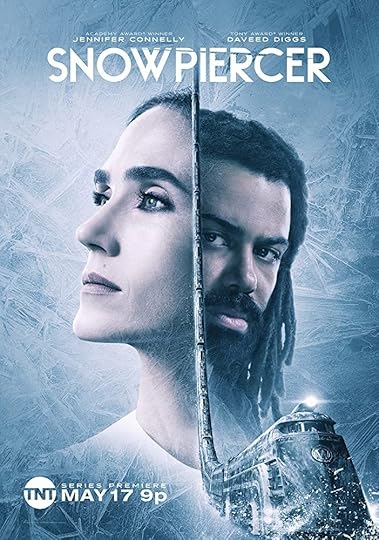
So, the second episode of Snowpiercer - 1.2 - didn't pierce too many veils, snowy of otherwise.
We learned that
the administration is a cruel bunch, freezing off a tailee's arm (but we already knew they were cruel) by sticking it out of the speeding train into the freezing coldAndre and his former wife are still good in bed together (of course they are)thawing someone out of the cryogenic drawings is no quick or easy processBut on that last point, I do find those drawers worthy of more unpacking. It's interesting that, in a frozen world, the people on the train use freezing to take people found guilty of murder out of circulation. I wonder if there are cryogenic drawers anywhere on frozen Earth outside of the train? Hey, it's apparently so cold out there that you might not need any special cryogenic process to freeze anyone. Maybe there are hundreds, thousands, even millions of people unintentionally cryogenically frozen, or frozen by nature not technology.
Also, this may have been explained and I missed it, but why don't they just execute someone found guilty of murder, rather than freezing them. Were there some doubts about the condemned? We already know how brutal the administration is, and it must cost plenty of energy to keep someone cryogenically frozen.
And, while we're on the subject of cryogenics, why not just freeze a whole bunch of people and send them on a ship to Alpha Centauri? Better than dying here on Earth, right? And better than a train. Well, maybe there wasn't time for a space launch, but surely the snowpiercer took some time to put together.
Looking forward to seeing how some if any of these frozen prospects pan or thaw out in the weeks ahead.
See also Snowpiercer 1: Promising Hybrid
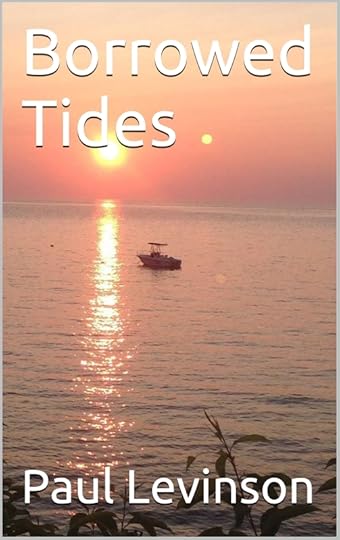
first starship to Alpha Centauri, with just enough fuel to get there
Paul Levinson's books ... Paul Levinson's music
Published on May 25, 2020 12:50
May 24, 2020
Killing Eve 3.7: The Omelet

My favorite scene in Killing Eve 3.7 tonight was the omelet near the beginning - more specifically, the way Carilyn uses the omelet as a token of her approval or not, withdrawing it from Mo, then giving it to Eve, then withdrawing it from Eve, because she's so obsessed with Villanelle. And the omelet is spoken of again, in close to Mo's last words, before he is killed. The symbolism is good. The writers/directors/producers of whoever came up with it have no eggs on their faces.
The killing of Villanelle's handler might have been my favorite scene, except she wasn't quite killed, and, sure enough, turns up later alive if not well in a hospital bed. Right next to Konstantin, who also could have died of a heart attack on the train station, but didn't. Make that a semi-major and a very major character who are villainous and could have died in this episode, almost died, but didn't. And who does die? Mo, who was a good guy, if not a major player.
Indeed, the only reason to kill Mo is that it's more reason to unhinge Carolyn, after what happened to Kenny. And she more or less takes it in stride, upset, for sure, but only breaking some valuable vases or whatever they were to express her inner anguish after prodded by her daughter. If the killings of Kenny and Mo were both for the purposes of testing Carolyn's cool, that strikes me as too high a price to pay. On the other hand, wasn't it V. I. Lenin who said that if you want to make an omelet, you have to break some eggs? Yeah, but I guess that's a metaphorical omelet.
And next week is the season finale. Eve and Villanelle tonight were like ships passing in the night, once again, or ships passing on the train, or trains passing in the night, or strangers in the night, to quote Sinatra. I have a feeling, the way this season is going, that not much more will be resolved between them in the finale. But I do think that the brunette who killed poor Mo will play a role, or maybe a roll, if another omelet is involved.
See also Killing Eve 3.1: Whew! ... Killing Eve 3.2: Bringing It Into Focus ... Killing Eve 3.3: The Third Time's the Charm ... Killing Eve 3.4: Tip Toe Through the Tulips ... Killing Eve 3.5: The Darkness ... Killing Eve 3.6: Wounded
And see also Killing Eve 2.1: Libido and Thanatos ... Killing Eve 2.2: Villanelle as Victim ... Killing Eve 2.3 Lipstick ... Killing Eve 2.6: Billie ... Killing Eve 2.7: Death and Sex ... Killing Eve Season 2 Finale: Possibilities After the End
And see also Killing Eve: Highly Recommended (Season 1)

Paul Levinson's books ... Paul Levinson's music
Published on May 24, 2020 21:21
Hightown 1.2: Sludge and Sun

What's becoming even more clear in Hightown 1.2 is how vulnerable, flawed, anti-heroic, take your pick, the two main heroes, Jackie and Ray, are. This makes the story more realistic, more intriguing, as appealing in its narrative as in its Cape Cod locale.
Jackie gets into a fight in rehab, because she can't resist an attractive patient that another patient had her eye on. Fortunately, she's able to leave, but that leaves her less likely to resist drinking, which she nonetheless manages to resist. And she manages to get to Barnstable to pursue a lead in the murder case.
Ray doesn't yet know that Jackie is working on this, and he has problems of his own. He's falling for Renee, masturbating as he listens to her and Frankie, unable to resist walking into her club, while she's working, until he sees that Osito is there, too. When he later confronts Renee about that, she realizes he was spying on her, and of course is none too happy with that. The course of true lust never did run smooth, and there may be something deeper than lust in their feelings.
The important thing for both Jackie and Ray - what'll help them keep their heads above water - is making progress on the murder. But their adversaries on the Cape, as beautiful as it is, are a nasty, ugly bunch. Osito seems always on the verge of killing someone. And his boss Frankie is one tough operator.
Junior is right in the middle of these flawed good guys and unremitting bad guys. He dumped Sherry's body but wants out of that work. He's a more reformed alcoholic than Jackie. But he's still under Frankie's thumb, and it's tough to say what he'll do if Frankie insists that Junior do something worse than unsavory.
All of which adds up to a cop show knee-deep in sludge with the bright sun above.
See also Hightown 1.1: Top-Notch Saltwater and Characters

Paul Levinson's books ... Paul Levinson's music
Published on May 24, 2020 15:58
My Amazingcon Schedule
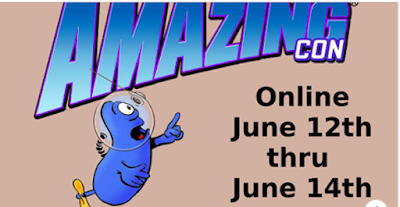
100% virtual, online ... attendance is FREE! ,,, but you need to Register here
June 13, Saturday, 2pm
PANEL: ST: PICARD. DID AN SF AWARD WINNING AUTHOR AS SHOWRUNNER MAKE A DIFFERENCE?
Michael Chabon, winner of both the Hugo and Nebula awards, ran the show for Star Trek: Picard. Join the panel as they discuss whether or not having an insider behind the wheel made a science-fictional difference.
With Dave Creek, Paul Levinson & Erin Wilcox
June 13, Saturday, 6pm
PAUL LEVINSON IN CONCERT
Author, songwriter & singer, Professor Paul performs live from his recently released album, Welcome Up: Songs of Space and Time, and his 1972 album, Twice Upon A Rhyme
June 14, Sunday, 10am
PANEL: WORLD BUILDING 101 SESSION C
World building is a fundamental skill for science fiction, fantasy and horror writers. Listen in as world builders discuss their tricks and techniques.
With James Cambias, Paul Levinson, Rosemary Claire Smith & T.B. Jeremiah
June 14, Sunday, 12noon
READING: PAUL LEVINSON & BUD SPARHAWK
Paul Levinson will read from Robinson Calculator, followed by Q&A
full schedule here
Paul Levinson's books ... Paul Levinson's music
Published on May 24, 2020 10:22
May 23, 2020
Homecoming 2: The Perils of Forgetting

Just saw Homecoming 2 on Amazon Prime Video, and I wanted to review it before I forgot what I just saw.
Sorry, couldn't resist, but Homecoming 2 is even more about forgetting than was Homecoming 1. It features Alex, who wakes up at the very start of the narrative not knowing who she is, and Walter, back from Season 1, sans Julia Roberts' character, still wanting to know who he is, i.e., what he forgot.
The cause of all of this amnesia is some kind of juice from a plant grown on the Geist farm. When used as cream, it's almost miraculous in helping the skin heal. When taken internally, either by food or drink, it makes you forget.
Just how long your mind is lost is not clear. It could be forever. It certainly is long enough that Alex does not stop her lover and partner Audrey from drinking the red drink with the drug, after Walter and Geist have spiked everyone's punch at the big party. Alex not only has lost her intellectual memory of the woman she loved, she's lost that lovin' feeling. I missed hearing the Righteous Brothers sing that great song, with that masterful Phil Spector production, in background. (But here is it now, if you'd like to hear it.)
Since no such plant with those effects exist, Homecoming, especially this season, is almost as much science fiction as it is thriller, which is always fine with me. Of course, it's not impossible that I at some point in my life consumed such berry juice, and I've forgotten not only that I consumed it, but such a juice even exists. Hey, after sheltering in place at home for more than two months, almost nothing would surprise me.
Excellent acting in this second season, even though I missed Julia Roberts. Stephan James was just superb as Walter, able to modulate from sweet to angry in an heartbeat. Janelle Monáe was also excellent in the dual role of Alex before and after she lost her memories. And Chris Cooper was perfect as Geist.
I've always liked narratives about memory - so much so that I wrote The Consciousness Plague - and Homecoming 2 is a most worthy addition to the genre.
See also Homecoming 1: Memory Spliced, in Ten Short Parts
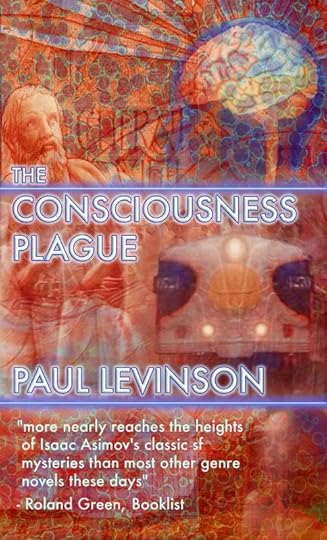 Paul Levinson's books ... Paul Levinson's music
Paul Levinson's books ... Paul Levinson's music
Published on May 23, 2020 23:00
Levinson at Large
At present, I'll be automatically porting over blog posts from my main blog, Paul Levinson's Infinite Regress. These consist of literate (I hope) reviews of mostly television, with some reviews of mov
At present, I'll be automatically porting over blog posts from my main blog, Paul Levinson's Infinite Regress. These consist of literate (I hope) reviews of mostly television, with some reviews of movies, books, music, and discussions of politics and world events mixed in. You'll also find links to my Light On Light Through podcast.
...more
- Paul Levinson's profile
- 340 followers



